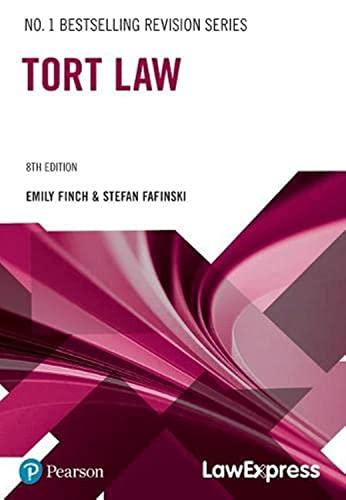Question
In Kyllo v. U. S., a federal magistrate judge issued a warrant authorizing a search of Kyllo's home for evidence of an indoor marijuana growing
In Kyllo v. U. S., a federal magistrate judge issued a warrant authorizing a search of Kyllo's home for evidence of an indoor marijuana growing enterprise based on tips from informants, utility bills, and a thermal imaging scan which indicated that excess heat was being produced. What do you think the Supreme Court decided about law enforcement officials doing a thermal image scan of the home without a warrant?
Group of answer choices
A. People do not have an expectation of privacy in their homes, so the use of a thermal imaging scanner was not an invasion of the privacy, so the scan could be done without a warrant.
B. Kyllo was convicted for growing marijuana based on double jeopardy.
C. Kyllo had an expectation of privacy in his home and the use of a thermal imaging scanner was an invasion of the privacy, so the scan could not be done without a warrant.
D. None of the answer choices are correct.
Can the vice president of operations for meat-packaging facility have the sufficient mens rea to be held liable for manslaughter if he refused to attend meetings related to the hazardous conditions in the plant that lead to worker deaths because he feared he would be criminally responsible once he hears the information that was going to be presented in the meetings?
Group of answer choices
A. Yes, under the doctrine of respondeat superior.
B. No, you never have to prove mens rea to hold someone criminally responsible.
C. No, actual knowledge of criminal activity is required for all corporate crimes.
D. Yes, under the doctrine of conscious avoidance.
Is there an impact on a corporation's criminal penalties under the corporate sentencing guidelines if the company voluntarily reports criminal conduct?
Group of answer choices
A. Yes, its penalties will usually be decreased.
B. Yes, its penalties will be increased.
C. No. There would be no impact on the sentence by voluntary reporting.
The Foreign Corrupt Practice Act
Group of answer choices
A. allows payments designed solely to speed up the processing of paperwork.
B. allows for bribery only in those countries where bribery is the norm and a necessary condition of business.
C. governs the activities of all foreign companies throughout the world.
D. penalizes facilitation payments.
Step by Step Solution
There are 3 Steps involved in it
Step: 1

Get Instant Access to Expert-Tailored Solutions
See step-by-step solutions with expert insights and AI powered tools for academic success
Step: 2

Step: 3

Ace Your Homework with AI
Get the answers you need in no time with our AI-driven, step-by-step assistance
Get Started


